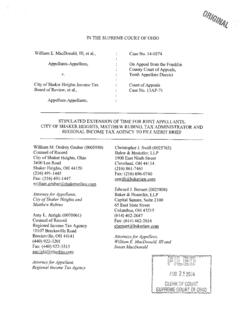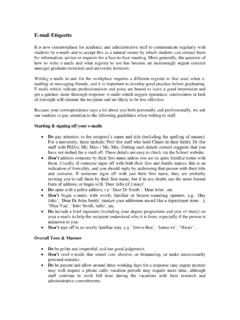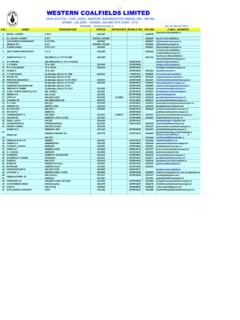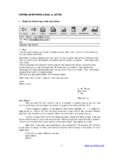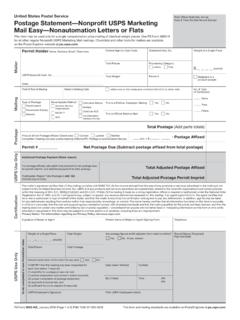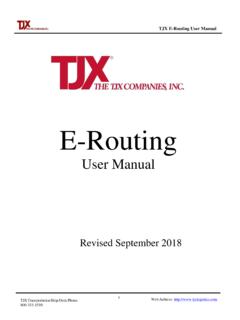Transcription of White v. King - Supreme Court of Ohio
1 [Cite as White v. king , 147 Ohio 74, 2016-Ohio-2770.]. White , APPELLANT, v. king ET AL., APPELLEES. [Cite as White v. king , 147 Ohio 74, 2016-Ohio-2770.]. Open Meetings Act Definition of meeting prohibits any private prearranged discussion of public business by majority of members of public body regardless of whether discussion occurs face-to-face, telephonically, by video conference, or electronically by e- mail , text, tweet, or other form of communication. (No. 2014-1796 Submitted November 17, 2015 Decided May 3, 2016.). APPEAL from the Court of Appeals for Delaware County, No. 14 CAE 02 0010, 2014-Ohio-3896.
2 _____. SYLLABUS OF THE Court . prohibits any private prearranged discussion of public business by a majority of the members of a public body regardless of whether the discussion occurs face to face, telephonically, by video conference, or electronically by e- mail , text, tweet, or other form of communication. _____. O'DONNELL, J. { 1} Adam White , a member of the Olentangy Local School District Board of Education, appeals from a judgment of the Fifth District Court of Appeals affirming an order granting judgment on the pleadings in favor of the board in an action involving Ohio's Open Meetings Act, The issue presented on this appeal is whether a series of e-mails between and among a majority of the members of a public body relating to a response to a newspaper editorial, which culminated in the publication of a response that the board later ratified at a public meeting.
3 Qualifies as a meeting for purposes of Supreme Court OF OHIO. Facts and Procedural History { 2} At the time pertinent to this matter, the school board consisted of White , Julie Feasel, Kevin O'Brien, Stacy Dunbar, and president David king . The amended complaint alleges that White independently conducted an investigation into alleged improper expenditures by two athletic directors employed by the Olentangy Local School District that resulted in one resigning and both being required to reimburse the district. Thereafter, on September 25, 2012, king , Feasel, O'Brien, and Dunbar amended a board policy to require that all communications between board members and staff first pass through the district superintendent or the district treasurer.
4 White voted against the policy change, and on October 11, 2012, the Columbus Dispatch published an editorial entitled Role Reversal in which it praised White for his vote and implicitly criticized the other board members for adopting a restrictive policy designed to thwart White from conducting further investigations into suspected illegal spending by district employees. { 3} king then sought to have Feasel, O'Brien, and Dunbar publicly respond to the editorial and directed that they and Superintendent Wade Lucas and district staff members Teresa Niehaus, Linda Martin, and Karen Truett collaborate and issue a response to the editorial on behalf of the board.
5 The board members and district employees did so in a series of e- mail exchanges. O'Brien submitted a proposed response signed by all board members except for White to the Dispatch. king then submitted a final response to the Dispatch that he signed in his capacity as board president indicating that Feasel, O'Brien, and Dunbar consented to its publication. The Dispatch published that response on October 27, 2012. { 4} Approximately six months later, White filed this lawsuit against king , Feasel, O'Brien, and Dunbar, alleging that they had violated the Open Meetings Act. That same day, at a regular board meeting, White advised the 2.
6 January Term, 2016. board of the lawsuit and moved that no public monies be spent defending the 4. board members, or in the alternative, if any public monies are spent defending the 4 board members, those members agree to reimburse the district for any monies spent. The motion died for lack of a second. king , Feasel, O'Brien, and Dunbar then voted to publicly ratify the response and deny that the board violated the Sunshine Law. White abstained from these votes. { 5} The board members answered the complaint and moved for judgment on the pleadings. White then moved for leave to amend his complaint and add the board itself as a defendant.
7 The trial Court granted White 's motion, ordered the clerk to file the amended complaint instanter, and denied the motion for judgment on the pleadings as moot. In the amended complaint, White sought a declaratory judgment that the board and other board members violated the Open Meetings Act, statutory damages, a temporary restraining order, and injunctive relief. The respondents answered and jointly moved for judgment on the pleadings pursuant to 12(C). { 6} The trial Court determined that king , Feasel, O'Brien, and Dunbar had immunity and were entitled to judgment on the pleadings in their individual capacities.
8 The Court also granted the board's motion for judgment on the pleadings for three reasons: no prearranged discussion of public business had occurred because the communications among the board members originated with an unsolicited e- mail from king , does not apply to e-mails, and at the time of the e- mail exchange, there was no pending rule or resolution before the board. { 7} On appeal, White challenged the Court 's ruling only with respect to the board. In affirming, the appellate Court held that the definition of meeting . in does not include sporadic e-mails and that the e-mails did not discuss public business, because at the time they were exchanged, there was no pending rule or resolution before the board.
9 And, despite the fact that the board 3. Supreme Court OF OHIO. later ratified the response to the editorial, ratification did not retroactively create a prearranged discussion of public business via e-mails. Finally, the appellate Court stated that mere discussion of an issue of public concern does not mean there were deliberations under the statute. 2014-Ohio-3896, 26. { 8} White has presented two propositions of law, which we accepted: Under the Ohio Open Meetings Statute, Ohio Rev. Code , liberally construed, private deliberations concerning official business are prohibited, whether such deliberations are conducted in person at an actual face-to-face meeting or by way of a virtual meeting using any other form of electronic communication such as telephone, e- mail , voicemail, or text messages.
10 Under the Ohio Open Meetings Statute, Ohio Rev. Code , when a board of education formally votes to ratify a prior action, the ratified action constitutes official business under the Statute. Positions of the Parties { 9} White maintains that he has established an Open Meetings Act violation in that king prearranged a private discussion regarding a response to a Columbus Dispatch editorial, a majority of the board members and district staff participated in that discussion in their official capacities, and that discussion resulted in a policy statement that the board later ratified. He also argues that sanctioning public bodies' avoidance of by discussing public business electronically subverts the purpose of the law and that incremental electronic communications violate the law, relying on State ex rel.
